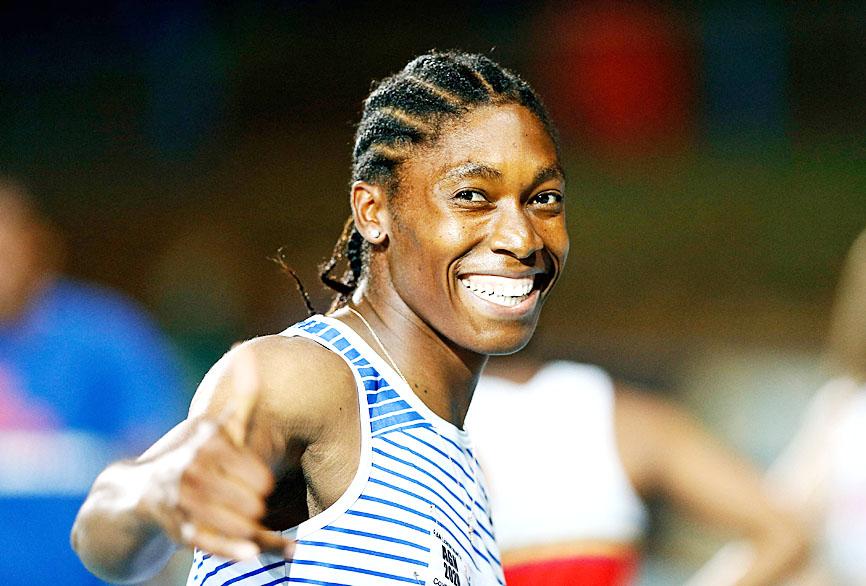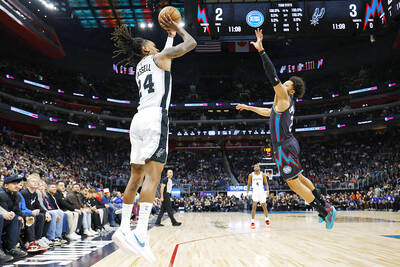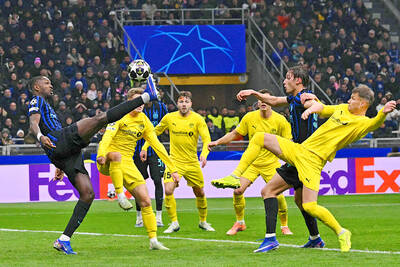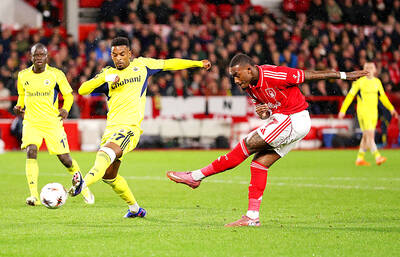The International Olympic Committee (IOC) on Tuesday said that no athlete should be excluded from competition on the grounds of a perceived unfair advantage due to their gender as it released a new framework on transgender inclusion.
No athlete should be excluded based on an “unverified, alleged or perceived unfair competitive advantage due to their sex variations, physical appearance and/or transgender status,” the IOC said.
However, the governing body added that it was not in a position to issue regulations that define eligibility criteria for every sport, leaving it up to federations to determine if an athlete is at a disproportionate advantage.

Photo: AFP
Ruling some athletes ineligible in some sports is still expected with safety noted as a specific issue for combat and contact sports.
“The framework is not legally binding. What we are offering to all the international federations is our expertise and a dialogue, rather than jumping to a conclusion,” IOC Athletes’ Department director Kaveh Mehrabi said. “This is a process that we have to go through with each federation on a case-by-case basis and see what is required.”
The 10-point document is to be rolled out after the Beijing Winter Games next year, replacing the guidelines issued in 2015.
It follows years of consultation with medical and human rights experts and, since 2019, athletes directly affected to help draft guidelines promoting fairness and inclusion.
It is published after the Tokyo Olympic Games where the first openly transgender athlete, weightlifter Laurel Hubbard, competed at the Games and defending 800m champion Caster Semenya is among track athletes with intersex conditions and naturally high testosterone levels excluded from their events.
The new framework also moves away from the old policy that said transgender athletes would be allowed to compete provided their testosterone levels were below a certain limit for at least 12 months before their first competition.
The IOC also said sex testing and “invasive physical examinations” used to verify an athlete’s gender were “disrespectful” and “potentially harmful.”
“We really want to make sure that athletes are not pressured or coerced into making a harmful decision about their bodies,” IOC head of human rights Magali Martowicz said.
“Athletes should be allowed to compete but unfair advantage needs to be regulated,” said the IOC, which plans to help fund research into elite performance by transgender and intersex athletes.
“We have not found the solution to this big question,” IOC spokesman Christian Klaue said. “Clearly this is a topic that will be with us for a long time.”
Additional reporting by AP

The Cleveland Cavaliers on Tuesday emphatically got back to winning ways in the NBA, coasting to a 109-94 victory over the New York Knicks as their recent star signing, James Harden, scored 20 points. The Cavs took the lead barely a minute into the game with an Evan Mobley three-pointer and never gave it up in a thoroughly comfortable night for the red-hot Ohio franchise. Former NBA Most Valuable Player (MVP) Harden, who was brought in from the Los Angeles Clippers this month, has never won a championship, despite being one of the most decorated players in the league. That was a key

LATE RALLY FAiLS: Jalen Duren led a late Detroit Pistons fightback, but it ultimately fizzled as a resolute San Antonio Spurs saw out the game Victor Wembanyama on Monday led a defensive masterclass as the San Antonio Spurs outmuscled the Detroit Pistons 114-103 in an intense and aggressive clash between the NBA’s two most in-form teams. Sitting second in the Western Conference, the Spurs were pushed hard for their ninth straight victory by the East-topping Pistons, who had entered the home court matchup on a five-game winning streak of their own. Defenses dominated the first meeting between the two sides this season, with Wembanyama making six blocks and 17 rebounds to fuel transitions as the Spurs pulled clear in the latter stages. While the Pistons’ shooting was at

HAT-TRICK: In the other games, Newcastle United and Leverkusen also advanced, as did Atletico Madrid, with Alexander Sorloth scoring three goals What a difference a year makes. Or nine months to be precise. Last season, Inter reached the UEFA Champions League final in style, with thrilling victories over Bayern Munich and Barcelona, but on Tuesday, the Italian giants limped out of the competition with a disappointing 2-1 loss at home to Bodo/Glimt — knocked out in the playoff round 5-2 on aggregate — in what is being labeled as one of the biggest upsets in Champions League history. It was not the first major upset the tiny Norwegian team have pulled off this season after wins over Manchester City and Atletico Madrid, and

Fenerbahce on Thursday earned a rare 2-1 win in England, but were still knocked out of the UEFA Europa League by Nottingham Forest in the playoffs. Forest entered the second leg with a healthy 3-0 lead from the opener in Istanbul — where Vitor Pereira made an impact in his first game in charge — and that proved enough to advance to the round-of-16 with a 4-2 aggregate score. The result was a boost for Forest, struggling at 17th place in the Premier League, in their return to Europe after three decades. They next face Real Betis Balompie or Kerem Akturkoglu gave Fenerbahce